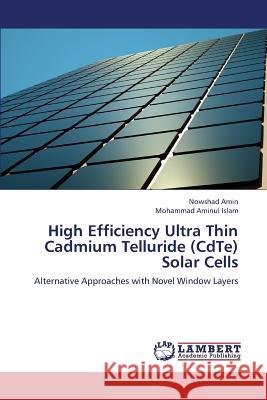High Efficiency Ultra Thin Cadmium Telluride (CdTe) Solar Cells » książka
High Efficiency Ultra Thin Cadmium Telluride (CdTe) Solar Cells
ISBN-13: 9783659369438 / Angielski / Miękka / 2013 / 148 str.
Thin film cadmium telluride absorbers with cadmium sulphide hetero-junction partner are promising candidates for high efficiency low cost solutions of solar energy harvesting devices. These devices have band gaps well-suited for effective absorption of sunlight. Most importantly, the materials used in these devices can be deposited in a variety of industry-friendly ways, so that the cost associated with manufacturing is generally lower than other available technologies. Although poly-crystalline CdS has been found to be the best suited heterojunction partner for CdTe solar cell, the conventional polycrystalline CdS/CdTe cell has few issues that limit device performance. In order to overcome these problems, this study proposes the introduction of poly-CdS to amorphous oxygenated CdS (a-CdS: O) as window layer. The a-CdS: O window material has higher optical band gap (2.5-3.1 eV), better lattice match with CdTe absorber materials and reduced inter-diffusion tendency of CdS and CdTe layers. This book systematically demonstrates the conversion process of poly CdS to a-CdS: O and develops a strategy for the fabrication of suitable a-CdS: O layer to be applied in CdTe solar ce
Thin film cadmium telluride absorbers with cadmium sulphide hetero-junction partner are promising candidates for high efficiency low cost solutions of solar energy harvesting devices. These devices have band gaps well-suited for effective absorption of sunlight. Most importantly, the materials used in these devices can be deposited in a variety of industry-friendly ways, so that the cost associated with manufacturing is generally lower than other available technologies. Although poly-crystalline CdS has been found to be the best suited heterojunction partner for CdTe solar cell, the conventional polycrystalline CdS/CdTe cell has few issues that limit device performance. In order to overcome these problems, this study proposes the introduction of poly-CdS to amorphous oxygenated CdS (a-CdS:O) as window layer. The a-CdS:O window material has higher optical band gap (2.5-3.1 eV), better lattice match with CdTe absorber materials and reduced inter-diffusion tendency of CdS and CdTe layers. This book systematically demonstrates the conversion process of poly CdS to a-CdS:O and develops a strategy for the fabrication of suitable a-CdS:O layer to be applied in CdTe solar cells.











